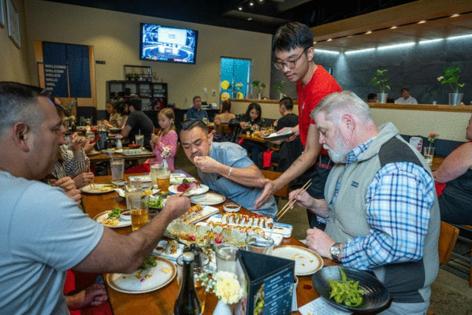Like Trump, California lawmakers want to end taxes on tips. Does it have a chance?
Published in News & Features
SACRAMENTO, Calif. — Following in the policy footsteps of both major presidential candidates, some California lawmakers want to end state income taxes on tips.
“Working class Americans are working so hard and they’re having a really hard time making ends meet,” Sen. Rosilicie Ochoa Bogh, R-Yucaipa, the bill’s author, said in an interview. “They need relief.”
Republican President-elect Donald Trump first proposed exempting tips from federal income taxes. It also became part of Democratic Vice President Kamala Harris’ platform.
Ochoa Bogh called it “a great idea that both parties recognize Americans could benefit from.”
The bill has one Democratic coauthor, Sen. Melissa Hurtado, D-Sanger, but it’s unclear whether enough other Democrats – who hold a supermajority in the legislature – will support it.
Since Harris’s defeat in the November election, top Legislative Democrats, Senate President pro Tem Mike McGuire and Speaker Robert Rivas, have pledged to work on making California a more affordable place to live during the next two-year legislative session. McGuire did not respond to a request for comment about the tips proposal.
California also faces a roughly $2 billion deficit ahead of the next fiscal year. It’s unclear how much the proposal would cut into state tax revenues if it’s approved. A spokesperson for the California Franchise Tax Board said the agency could not estimate how much the bill might cost because tipped workers report their tips and regular wages together.
Ochoa Bogh, who was recently elected to a second term in the state Senate, argued the proposal would benefit a set of workers that is disproportionately made up of women and people of color.
According to a white paper from the National Women’s Law Center, nearly 70% of tipped workers are women and more than a quarter of tipped female workers have a child under the age of 18.
The San Bernardino County Republican said her mother supported her and her siblings on a waitress’ income. As a teen and young adult, Ochoa Bogh would work for tips in her fathers’ restaurant.
She also believes tips should be exempt from taxes because they’re “not mandatory but something you get as a thank you for going above and beyond.”
While endorsed on the campaign trail earlier this year by both major presidential candidates, economists are skeptical of the proposal, both at the state and federal level.
“I think this is a solution in search of a problem,” said Alex Muresianu, a senior policy analyst with the Tax Foundation who wrote about the federal proposal. “There isn’t a clear reason why tipped income should not be taxed like other forms of labor (or) salaried income.”
Tipped workers make up a small percentage of the general workforce – about 2.5%, according to some estimates – as well as low-to-middle income workers.
“Beyond that, a lot of the lowest-income tipped workers wouldn’t even benefit from this policy because a lot of them are part-time workers who don’t make enough income to pay federal income tax to begin with because of the standard deduction,” Muresianu said. “So making tipped income tax exempt wouldn’t cut their taxes at all.”
He recommended policymakers who want to provide relief to low- and middle-income workers could expand earned income tax credits, raise the standard deduction or provide payroll tax relief.
“The thing that they all have in common is that they benefit the whole group of workers, not just one subset,” he said.
The Tax Foundation estimates the federal proposal could cost around $107 billion over the next decade if enacted.
____
©2024 The Sacramento Bee. Visit at sacbee.com. Distributed by Tribune Content Agency, LLC.







Comments